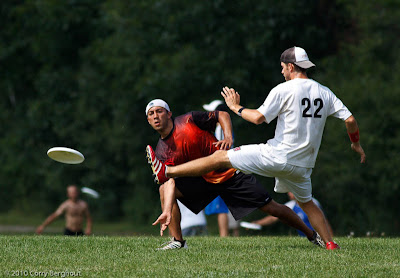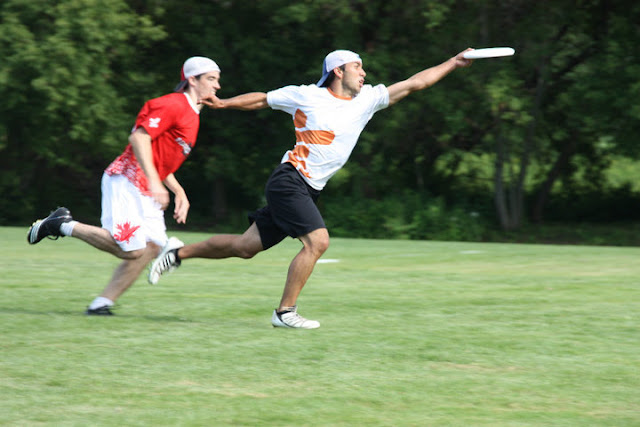 |
| Bishop's University in Sherbrooke hosts CUC2010. Photo by BU. |
The Canadian Ultimate Championships (CUC), perhaps the greatest event within Canada, brought together sixty-five teams in five divisions from all over the nation for four days of competition. CUC2010 was my first national conference outside of the University series and it exceeded all my expectations severalfold. I felt like a kid in a candy story. Thrilled by the possibilities, and coming face-to-face with teams I had followed online for the past several years, I could barely contain my excitement.
We had prepared for this moment all season and every game we played would reflect on our capacity as a team. During our last practice on the Tuesday before Nationals, we went over all the basics and the plays that we had practiced the entire season. Sort of like the final review before an exam, we paid close attention to details and walked through the strategies that were engraved in our minds.
 |
| Captain Andy Milne (6) throws a break-force backhand up the field against Mayhem. Photo by Tushar Singh. |
 |
| Rahil Suleman (74) bids for the disk. Photo by Tushar Singh. |
After three buses and a cab, I arrived in Sherbrooke on Friday at noon. A day and a half of Ultimate had already passed.
 |
| Tundra's Marc Hodges (27), throws a beautiful flick under a Mayhem defender's leg. Photo by Ed Kung. |
When I arrived at Bishop's University, I proceeded straight to Paterson Hall to check-in to the dormitories. One of our teammates had wisely booked several rooms on campus since we would be at the epicenter of all the fun (especially the parties!). Mackinnon Hall is a three-storey single and double room dorm with a large lounge and aged furnishings.
 |
| Christian Parsons (83) in action against BFC. Photo by Corry Berghout. |
We wanted to forget about our game against BFC at Mixed-Up and play hard Ultimate to earn a solid victory.
 |
| Michelle "Wangers" Wang (16) snatches the disk. Photo by Corry Berghout. |
Although it was disappointing to lose out the chance to be in the top eight, we reassessed our goals and wanted to top the 'ninals'.
We decided to stick around for a while after our game to observe the match between Maverick and Grand Trunk on one side, and between Phoenix and Q on the other. Phoenix, who had lost to Grand Trunk 12-11, was able to take a quick 15-6 win against Q. Grand Trunk asserted themselves against Maverick in 12-11 win, but would go on to lose to them 14-10 in the playoffs.
 |
| Phoenix's Derek Alexander (9), shreds his mark and throws an amazing flick. Photo by Corry Berghout. |
"Let's get our heads out of our as-es and play some fr-gging Ultimate! We should be burning them!" said one of our captains. We needed that kick to nudge us back on track as we took the game 13-9.
On the field beside ours, F-Bomb was playing Short Bus. We heard a lot of cheering from the F-Bomb side so I assumed they must have won, and they did win by a considerable margin 13-6. Now we'd have to face F-Bomb.
The game started of strong as we took the early lead and maintained that lead for the rest of the game. There was a point in the game which stretched for well over twenty minutes. Looking at the scoreboard on the field beside, I saw that BFC had scored five points against Hard in the time it took for that point against F-Bomb. One could see the exhaustion in the faces of all the players on the field. I overheard one of the F-Bomb female player voice her tiredness: "I can't go on anymore!" There were many turnovers that point as a result of the wind and miscommunication. But, we persevered and took the match 11-5.
Hard won against BFC in a close 11-9 game. BFC had pulled a "greatest" in that match and set the pace for the rest of the game. But, Hard never relented.
After a two hour break, we faced Hard just as the sun was right above us. The heat left our feet blistered and burnt, but we maintained our composure and played on. We looked to play the perfect game: focusing on tight containment on defence and no risk passes on offence. It was unfortunate that Hard suffered several injuries during the game but never relented.
We got the break and Joel Landy (19) got an amazing layout D up the line, picked up the disk and sent a beautiful flick to Norman Lew to win the game 12-9. Thus, we took 9th place in the Mixed Division.
The Juniors finals took place on Saturday evening and was definitely one of the greatest matches. Toronto's Overdrive and Vancouver's West Coast Reign showed the Ultimate world that they are the future of the sport. Overdrive's Brandon Lusty, brother of my teammate, Caitlind Lusty, was a star player and played a pivotal role in both offence and defence. Tundra decided to stick around and play the role of Brandon's personal cheering squad.
It was a tough loss for Overdrive as West Coast Reign took gold with a commanding 15-6 lead. There were tears and an overwhelming sense of disappointment in the eyes of all the Overdrive players. However, it was one of the greatest matches I have seen in my Ultimate career, and they should be proud of their accomplishment.
That night's party was surely one to remember, if I could remember it at all. I vaguely recall there being a band, a stage, a lot of drinks, and people dancing uncontrollably and without rhythm. If you were there, you'd savour it, if you weren't, then I'd rather not say. I'll leave the rest to your imagination.
 |
| ONYX and fans cheer as they win 14-12 against RIP in the finals. |
Next up, the Women's finals between Stella and Storm. Both teams played really well in the finals match and I got to learn a lot from watching their match. The thing that distinguishes Women's Ultimate is their reliance on clean cuts and solid throws. It's less of a huck game, although there were some beautiful huck points. I paid special attention to the handlers who made the most of the space they were give to work with and moved the disk quickly. Storm played a four-person cup on some of their points and it was difficult for the Stella handlers to move the disk upfield in the gust.
 |
| Stella (green) versus Storm (violet) in the Women's Finals. |
Storm eventually got a good lead on Stella and the crowd in the stands erupted as they took the championship match 15-6.
 |
| Phil Watanabe (far right) giving important words of advice and encouragement to the Moondoggies. |
 |
| Inian (33) supporting from the sidelines after his injury. |
In the stands, a small crowd of Torontonians supported the Moondoggies with howls and cheers at every point. One supporter, having no clue of the sport and obviously drunk, decided to chant "Go Leafs Go!" for the duration of the game further perpetuating the stereotype of the "obnoxious Toronto folk" in the minds of the peaceful Quebecers. Albeit, it provided entertainment and a conversation topic for the ride home.
 |
| The Moondoggies are the CUC2010 Open Champions. They shake the hands of their opponents in Mephisto. |
Overall, this was a great experience and definitely a great close to a wonderful season. As a personal goal, I had strived to not turning over the disk and that remained true even till the very end. I love my team and I will surely miss playing and practicing with them. I want to thank my team for always supporting me and taking care of me. I want to thank Andy, Neil, and Eric for seeing potential in me and allowing me to join the team.
Twenty-five practices. Five tournaments. Two tryouts. One training camp. And one solid team!
This was my first touring experience and I'm sure it won't be my last.

















